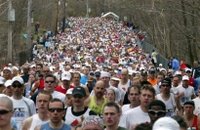Boston Marathon Record

BOSTON - Robert Cheruiyot set a course record in the Boston Marathon on Monday as he and women's winner Rita Jeptoo pulled off a Kenyan sweep. It was an outstanding day for the Americans, too. U.S. runners Meb Keflezighi, Brian Sell and Alan Culpepper came in third, fourth and fifth, 23 years after the last American winner, Greg Meyer.
Maybe American Marathoners are getting better. We've not had shit in the field in a long time. The Kenyans are, once again, the shit though.
Today I am off and loving it!

4 Comments:
So Mr. Bangorhard, why do the Kenyans kick the Royal Shit in the distance events? And don't give me that hoohaa about being chased by lions all day.
4:24 PM
Why Are Kenyans Fast Runners?
By Brendan I. Koerner
There are a few popular theories, which break along nature-versus-nurture lines. The vast majority of Kenya's brightest running stars were born and raised at high altitude. Running at higher elevations builds greater lung capacity, because athletes grow accustomed to the thinner air. Many of the finest runners, for example, hail from the hilly region surrounding Eldoret, about 7,000 to 8,000 feet above sea level. This area also possesses a fairly mild climate that allows for year-round running.
If altitude alone determined distance-running success, of course, then Nepalese marathoners would dominate. So, perhaps a more important factor is the nation's running culture, particularly among the Kalenjin tribe. Though Kalenjins represent just 12 percent of Kenya's population, they comprise about three-quarters of the nation's elite runners. The trend started with Kip Keino, who won Olympic gold in the 1,500 meters in 1968 and added an Olympic steeplechase title in 1972. The ex-policeman's success inspired succeeding generations of Kalenjins, who grew up idolizing Keino. As a result, Kalenjins now aspire to distance-running titles in the same way American youths dream of playing in a Super Bowl. (Okayo, who set a new course record for women in New York, is one of the few Kenyan marathon stars not of Kalenjin extraction.)
Because interest in running is so high, competition to make traveling squads is intense, and Kenyan training regimes are notoriously difficult. And many young Kenyans view distance running as a ticket out of poverty. Kalenjins, in particular, grow up seeing the wealth of returning marathon champions, whose relatively modest earnings abroad—the top prize at New York was $100,000—make them rich men and women by Eldoret standards.
Physiology and genetics may also factor into the Kenyans' accomplishments. In 2000, the Danish Sports Science Institute published a study that compared the distance-running prowess of several Kalenjin youths—all of them competitive neophytes—against those of a Danish track star, Thomas Nolan. Though the boys had just three months of formal training, they easily beat Nolan in a 12-and-a-half-lap race. The researchers concluded that the Kenyans had a born advantage and speculated that it might have something to do with their "birdlike legs." (The study incensed a number of Kenyan running heroes, including Keino, who viewed the results as an affront to the Kenyan work ethic.)
More obscure anecdotal theories also abound. It has been suggested that Kenyan children are aided by the fact that many run to and from school. Two-time Olympian Charles Cheruiyot, for example, has stated that young Kenyans typically run 10 miles a day. But other top-flight Kenyan runners have pooh-poohed this theory, denying that they ever so much as jogged to catch the morning bell.
Author John Manners, who has trained with the Kalenjins on their home turf, has opined that the tribe's cattle-herding background might play a role. In centuries past, the most successful members of the tribe were those who could round up the most cows. These fleet-footed men were thus able to garner more wives, and in turn produce more children. Manners also ascribes some possible significance to the Kalenjin circumcision ritual, in which adolescent males must endure the snipping with nary a shudder. Compared with that pain, 26-plus miles is a snap.
5:07 PM
"These fleet-footed men were thus able to garner more wives, and in turn produce more children."
And, thus, continue to run like shit to flee the catastrophe they created at home.
5:22 PM
This shit is sick. I can't even drive a 5 minute mile. First the records fall at the LA Marathon, now the Boston. How fast do these dudes have to run the NY Marathon to keep breaking records? Yikes.
1:57 AM
Post a Comment
<< Home